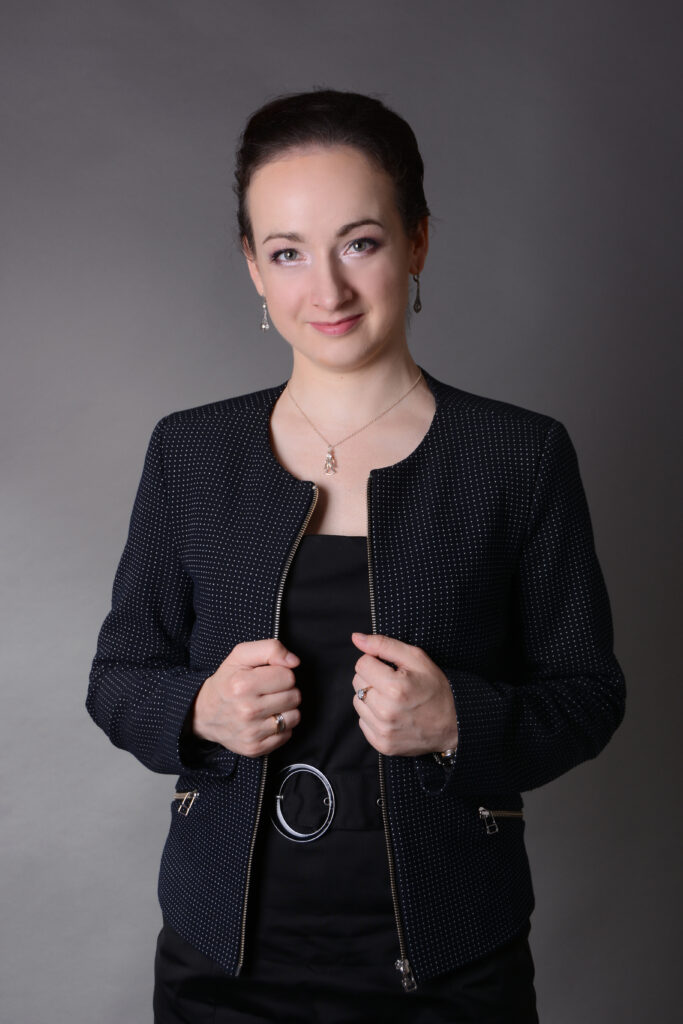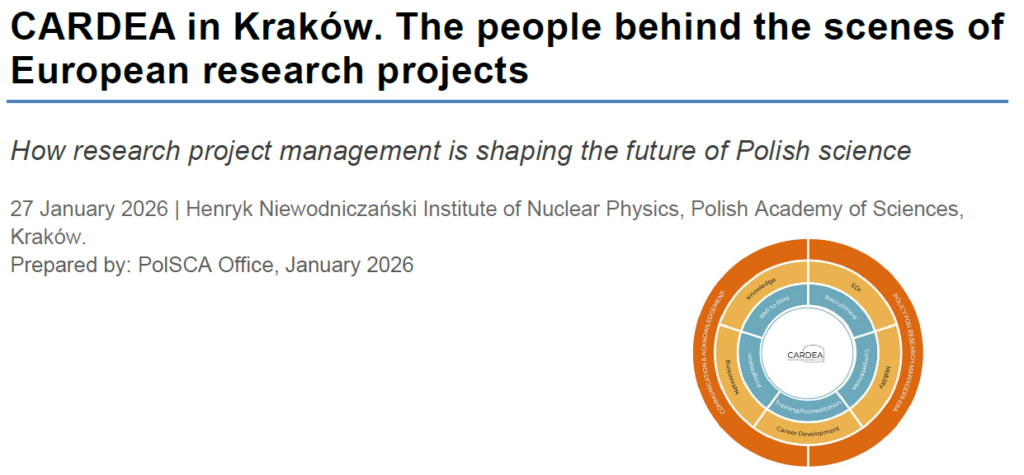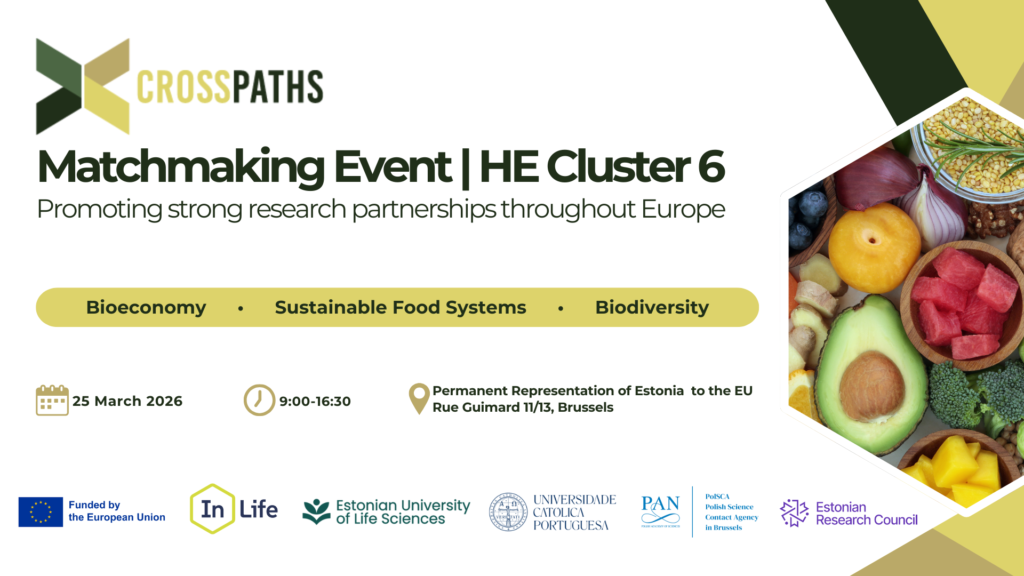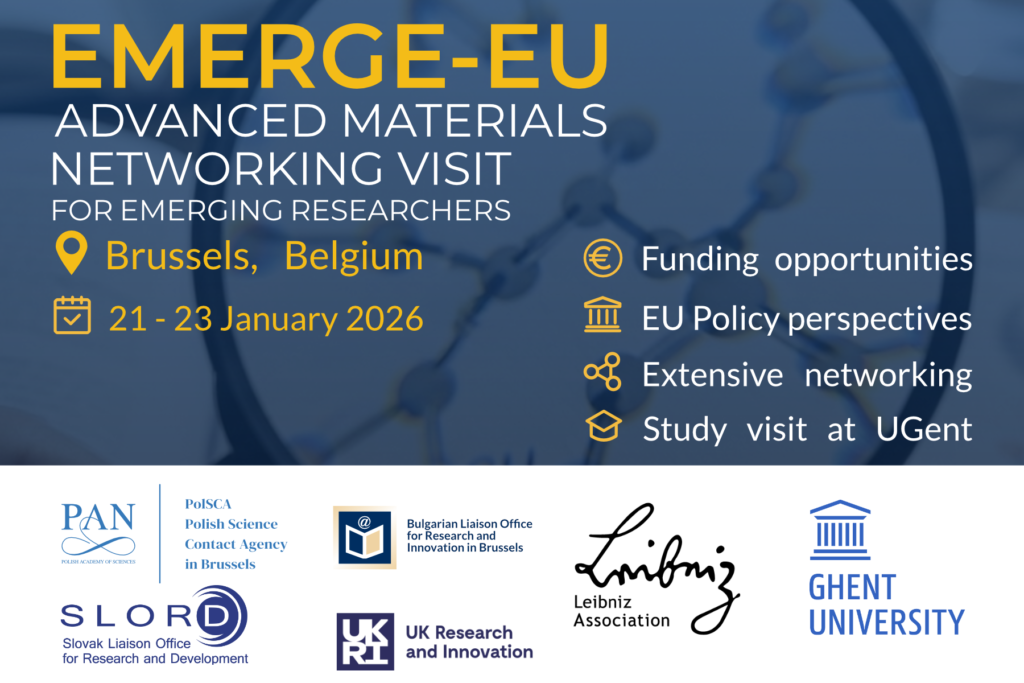CROSSPATHS Matchmaking Event on Horizon Europe Cluster 6
March 25 All day

The CROSSPATHS Matchmaking Event is a one-day networking and brokerage meeting dedicated to research and innovation actors interested in building project consortia for upcoming Horizon Europe Cluster 6 calls. The event is organised by the CROSSPATHS project consortium, in cooperation with the Brussels-based liaison offices ETAG and PolSCA PAN, together with a wider group of partner institutions from across Europe.
(wiecej…)V4 Training for Research Project Managers – 18th edition!
March 9 – March 11

We invite you to participate in the next edition of our flagship training course, ‘V4 Training for Research Project Managers’, which will take place in Brussels on 9, 10 and 11 March 2026. As in previous years, we are co-organising it in cooperation with the Czech Liaison Office for Education and Science (CZELO), the National Research, Development and Innovation Office in Hungary (NRDIO) and the Slovak Liaison Office for Research and Development (SLORD).
The V4 Training programme includes presentations by representatives of the European Commission, experts from liaison offices and Belgian academic centres. In addition, we encourage participants to actively participate in group discussions and networking meetings, during which they can exchange experiences.
Further details and application form: HERE
PolSCA Connects Brussels – community, dialogue and European cooperation in R&I

Building community, exchanging perspectives and discussing the future of European research and innovation policy – this was the spirit of the first meeting in the PolSCA Connects Brussels series. The New Year edition brought together more than 40 professionals engaged in the European R&I ecosystem, creating space for networking and discussion on the future direction of EU programmes, as well as examples of projects implemented and coordinated by Polish research institutions
(wiecej…)PolSCA Masterclass: research Project Management using the PM2 methodology – summary of 2nd edition!

The second edition of the PolSCA Masterclass workshops was a two-day, intensive programme devoted to the practical aspects of professional management of projects funded through European funds. Participants explored the PM2 methodology, developed by the European Commission specifically for EU-funded projects, with a particular focus on the specifics of research projects. Attention centred on the key components of effective managementand the workshops followed an interactive format, based on hands-on work with real-life case studies and simulation exercises.
(wiecej…)PolSCA Masterclass. Research project management using the PM2 methodology – 2nd edition.
February 9 14:00 – February 10 17:00

PolSCA Office is opening February with the 2nd edition of Project Management Masterclass workshops, dedicated to managing research projects according to the PM² standard. The two-day workshops aim to familiarize participants with tools and techniques that facilitate effective planning, implementation, and monitoring of projects funded by European resources.
Particular emphasis will be placed on the project life cycle, team roles and structures, risk and change management, as well as communicating results in line with the requirements of the European Commission. The sessions will be conducted in the form of practical workshops, also including case study analysis.

The workshops will be led by Dr. Justyna Małkuch-Świtalska – researcher developer, project manager and leader, certified coach and mediator. She specializes in designing and evaluating international training programs for researchers and research managers, as well as in the analysis of researchers’ competencies.
More about Trainer: see here
The event will be an opportunity not only to gain practical skills related to managing research projects in the PM² standard, but also to exchange experiences between research managers and scientists.
The workshops are organized within the framework of the Horizon Europe Navigators network – an initiative of the PolSCA Office, launched in 2021 in synergy with the PASIFIC program. The network brings together research managers from 62 institutes and several auxiliary units of the Polish Academy of Sciences, supporting the exchange of good practices and the development of competencies related to the Horizon Europe program. Regular meetings and trainings within HE Navigators foster the increased participation of PAS institutes in European projects.
The event is organized in cooperation with the Institute of Computer Science of the Polish Academy of Sciences in Warsaw.
Programme of the workshop (PL version 1.0)
PolSCA Connects Brussels! New Year’s lunch for the Polish community active in Brussels in the field of science policy
February 6 13:00 – 15:00

These meetings will be dedicated to Poles working in Brussels in the field of science policy – in EU institutions and organisations and entities related to the European research and innovation ecosystem. As part of this series, we want to encourage professional networking, support the exchange of contacts and strengthen cooperation among Polish experts and practitioners involved in shaping European science policy in a pleasant and relaxed atmosphere.
At the same time, we would like to invite selected guests – including scientists from Poland – to participate in these informal meetings, who will tell us about their research and current challenges facing Europe in the form of lightning talks. This time, we will look at how new technologies are changing the approach to cultural heritage. Our special guest will be dr Żaneta Żegleń (Jagiellonian University in Krakow), coordinator of the IMPULSE project.
Due to the closed nature of the event, participation is only possible for invited guests.
The CARDEA meeting in Kraków is already behind us!

The CARDEA consortium meeting in Kraków showed that winning European grants takes more than scientific excellence. It also takes professional research management. On 27 January 2026, the Henryk Niewodniczański Institute of Nuclear Physics PAS hosted research managers, project administrators and grant specialists who turn ambitious scientific ideas into workable, well-run projects.
The programme focused on hands-on exchange rather than formalities: from leadership and managing international grants, through a discussion on how Polish institutions can build stronger, system-level support, to a study visit to the cyclotron and proton therapy facility at Cyclotron Centre Bronowice. The takeaways are clear: research management is becoming a foundation of success in Horizon Europe projects, PolSCA strengthens its role as a bridge between Brussels and Polish research centres, and the emerging PolARMA initiative has real potential to build a professional community with shared standards.
Download the full article to explore the key insights and what they mean for the future of Polish science:
Join to the CROSSPATHS Matchmaking Event on Horizon Europe Cluster 6!
Promoting strong research partnerships throughout Europe

Join a matchmaking event for R&I stakeholders seeking to build consortia for upcoming Horizon Europe calls, in line with current and emerging EU priorities. Brought by the HE CROSSPATHS Consortium in partnership with Brussels-based ETAG and PolSCA liaison offices, the event brings together policy context and practical insights with pitching sessions and bilateral meetings, offering a practical platform for initiating project cooperation within HE Cluster 6 calls. The event will take place in Brussels on 25th March 2026.
(wiecej…)EMERGE-EU Study Visit Recap: Building European Connections in Advanced Materials

For the first time, the PolSCA PAS Office engaged in the organisation of an international study visit addressed directly to researchers, rather than to its traditional national audiences or expert and managerial communities. Within the framework of the EMERGE-EU initiative, PolSCA co-organised a three-day networking study visit for emerging researchers in advanced materials, implemented in cooperation with fellow Brussels-based liaison offices. This marked a new experience for the Office – both in terms of the target group and the international format – complementing PolSCA’s previous activities focused on funding instruments such as ERC and MSCA, or science-for-policy initiatives addressed primarily to the scientific committees of the Polish Academy of Sciences. Further details on the programme and outcomes of this study visit are presented below in the full recap.
(wiecej…)EMERGE-EU – PolSCA Office study visit to Brussels focusing on advanced materials
January 21 – January 23

PolSCA Office of the Polish Academy of Sciences is organising a study visit to Brussels focusing on Advanced Materials. This pilot project is an extension of the PolSCA Office’s activities for scientists, building on the success of a similar format implemented for research managers.
The study visit is being carried out in cooperation with international partners from Belgium, Bulgaria, Germany, Slovakia and the United Kingdom. This ensures an international composition of the group, promoting networking and cooperation in the field of new and advanced materials.
The EMERGE-EU study visit will take place on 21–23 January 2026 in Brussels. The participants of the visit are researchers working in the field of Advanced Materials who are at an early stage of their academic careers, i.e. postdoctoral researchers transitioning from R2 to R3. The study visit is an excellent opportunity for future scientific leaders interested in further strengthening their research careers and engaging in international cooperation.
The programme includes the following:
- sessions devoted to the perspective of the Directorate-General for Research & Innovation on advanced materials,
- sessions focused on opportunities offered by the European Research Council (ERC), the COST programme, and EIC instruments,
- sessions addressing issues related to research careers in the context of the European Research Area (ERA),
- matchmaking in a small, international group, including short participant presentations and one-to-one meetings,
- a study visit (site visit) to Ghent University.
This EMERGE-EU study visit is one of the activities organised by the PolSCA PAN Office to strengthen the presence of Polish scientists in the European research and innovation ecosystem, particularly in the field of new and advanced materials. The aim is to support researchers in developing their skills at the transition stage to scientific independence, help them to find their way around the European institutional environment, and build lasting international cooperation networks that can form the basis for future research projects and initiatives at a European level.
Detailed programme of the EMERGE-EU study visit is available here
Public consultations on the Advanced Materials Act (AMA)
The European Commission conducted public consultations on the Advanced Materials Act (AMA) until 13 January 2026. The initiative aims to strengthen the EU’s technological competitiveness and accelerate the deployment of innovations in the field of advanced materials. The AMA is intended to create a coherent and innovation-friendly regulatory framework and to support technology scale-up as well as the transfer of research results to industry. More information about this process is available on the PolSCA Office website.
Summary of the EMERGE-EU study visit is available here
Next Page »


